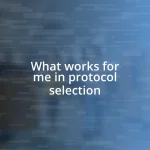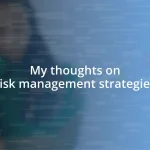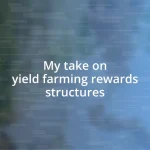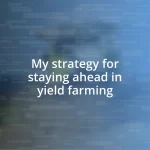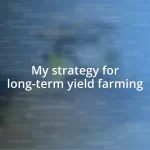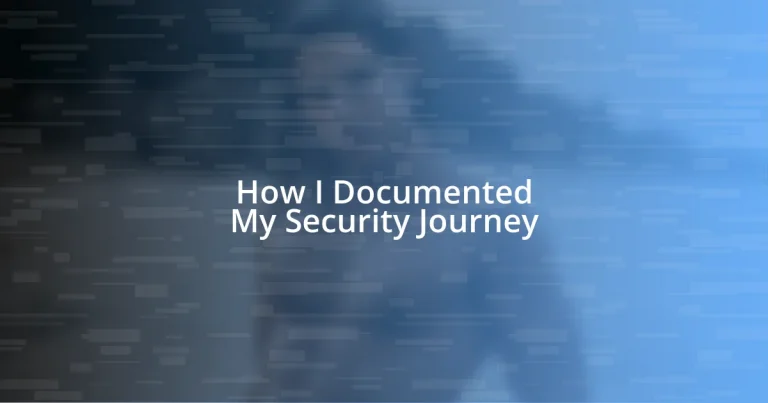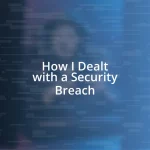Key takeaways:
- Encountering a major security vulnerability during the first job ignited a passion for cybersecurity and highlighted the importance of understanding security beyond just technology, focusing on human behavior.
- Overcoming initial challenges such as resistance from team members and the complexities of security protocols through collaboration, research, and mentorship was crucial for personal and professional development.
- Documenting progress and sharing experiences with others created a supportive community, emphasizing the importance of growth through flexibility, ongoing learning, and collaboration in the cybersecurity field.
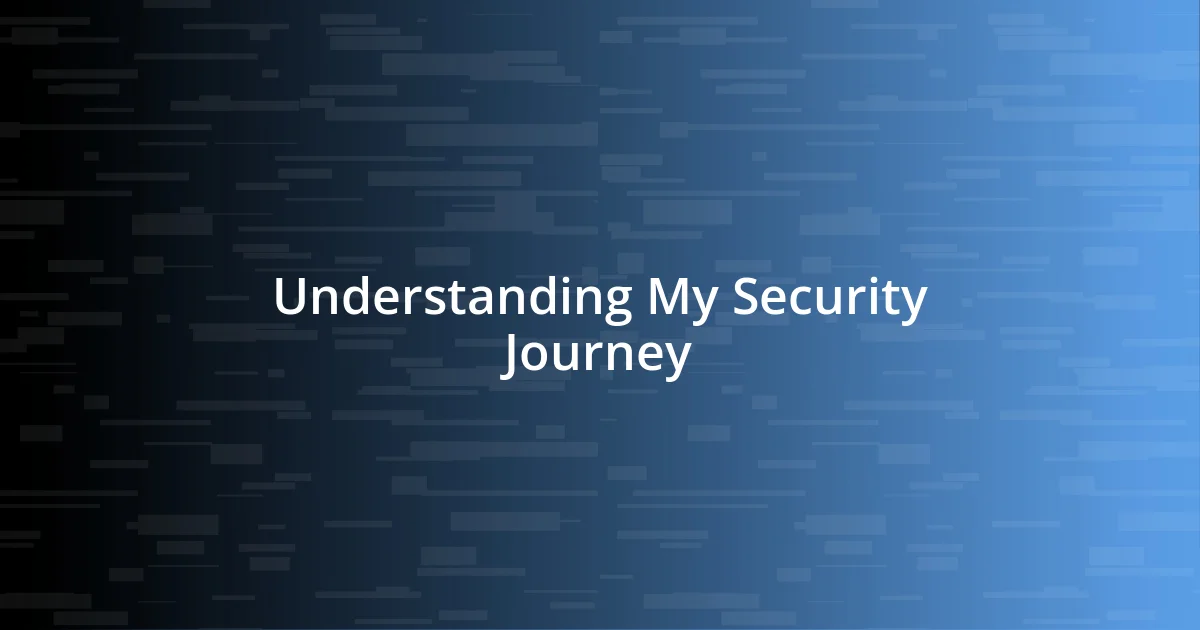
Understanding My Security Journey
My security journey began quite unexpectedly during my first job in IT. One evening, while troubleshooting a system error, I stumbled upon a major security vulnerability. I remember the mix of surprise and dread washing over me—what if this had been exploited? That moment ignited a passion to dive deeper into the world of cybersecurity.
As I progressed in my career, I faced various challenges that tested my resolve. I vividly recall an incident where a phishing attack almost compromised our entire network. The panic in my team was tangible—I could feel the weight of responsibility on my shoulders. That experience reinforced a key lesson: security isn’t just about technology; it’s about people and their behaviors.
Reflecting on my journey, I often wonder how many others share similar experiences. Have you ever encountered a moment that completely shifted your perspective on security? Those pivotal instances are what mold our understanding and approach, creating a stronger foundation for the future.
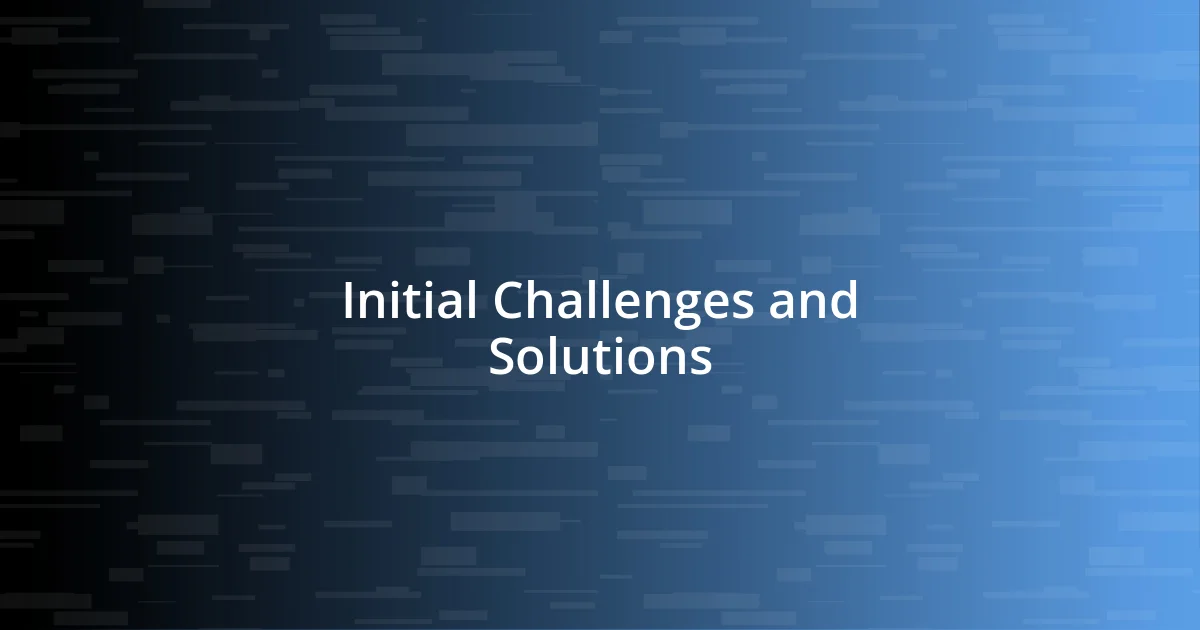
Initial Challenges and Solutions
As I embarked on my security journey, the initial challenge I faced was understanding the complexities of security protocols. One time, I was tasked with implementing a new firewall, but I quickly discovered the technology was overwhelming. It felt like trying to read an alien language! I spent long nights researching and testing, but in the end, I found clarity through trial and error.
Along the way, I encountered significant resistance from team members who were reluctant to adopt new security measures. One instance stands out—an employee nearly tore into me during a training session, convinced that the new software was unnecessary. It struck a nerve, but instead of backing down, I turned that moment into an opportunity for collaboration. By showcasing how these measures directly protected our work, I gradually gained their trust.
I learned early on that discovering the right resources could make a major difference. I recall locating an invaluable cybersecurity mentorship program after a particularly tough week. Connecting with a seasoned professional made me realize I wasn’t alone in facing challenges. This guidance was instrumental; it helped me navigate hurdles more confidently and opened up a supportive community I hadn’t even known existed.
| Challenge | Solution |
|---|---|
| Understanding protocols | Research and testing |
| Resistance from team | Demonstrating value |
| Feeling isolated | Finding mentorship |
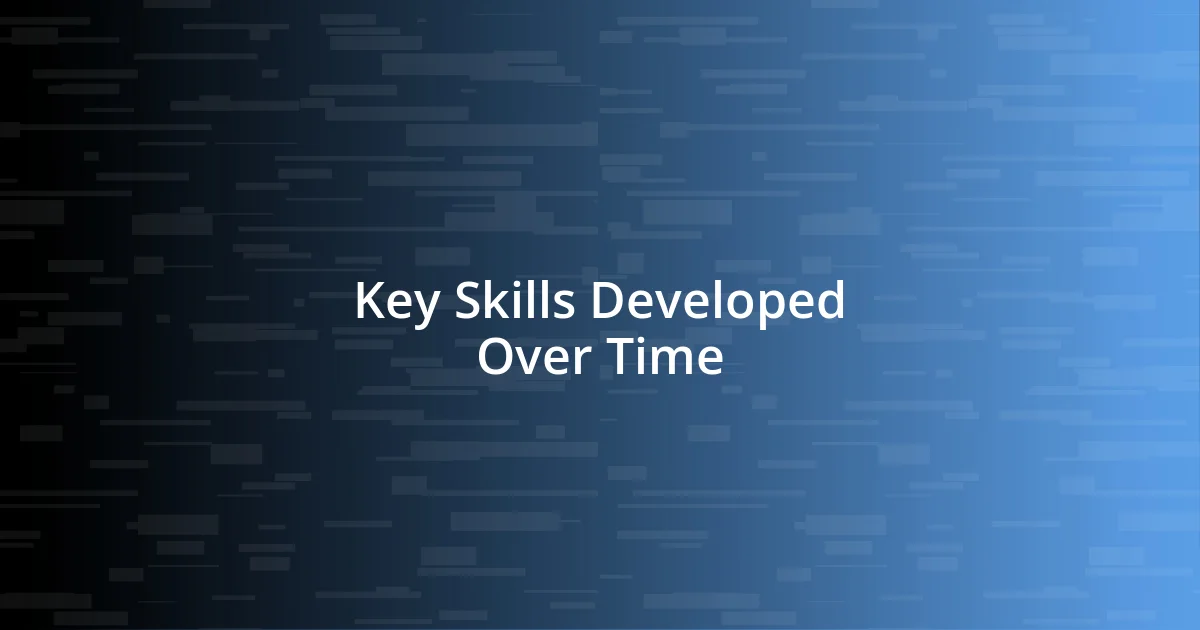
Key Skills Developed Over Time
As I navigated my security journey, I developed several key skills that became instrumental in my growth. One of the earliest skills I honed was the ability to analyze threats critically. I remember sitting at my desk one late evening, puzzling over an emerging malware strain. It was exhilarating and daunting all at once. That experience taught me not just to identify threats but also to understand their motivations and implications.
I also became adept at risk management, allowing me to assess vulnerabilities in a holistic manner. In one memorable project, I needed to evaluate a comprehensive security audit. Instead of focusing solely on technical issues, I learned to incorporate insights from various departments, emphasizing communication and collaboration. This approach transformed how I perceived security—not merely as a technical requirement but as a collective responsibility.
Here’s a summary of the key skills I developed:
- Critical Threat Analysis: Recognizing and understanding emerging threats.
- Risk Management: Evaluating vulnerabilities from a multidisciplinary perspective.
- Effective Communication: Facilitating discussions on security matters with non-technical staff.
- Collaborative Problem-Solving: Working with different teams to address security issues.
- Continuous Learning: Keeping up with evolving security trends and technologies.
Each of these skills played a distinct role in shaping my mindset and effectiveness within the security landscape. When I think back, it’s astounding how much they’ve impacted not just my career, but my personal approach to challenges in general.
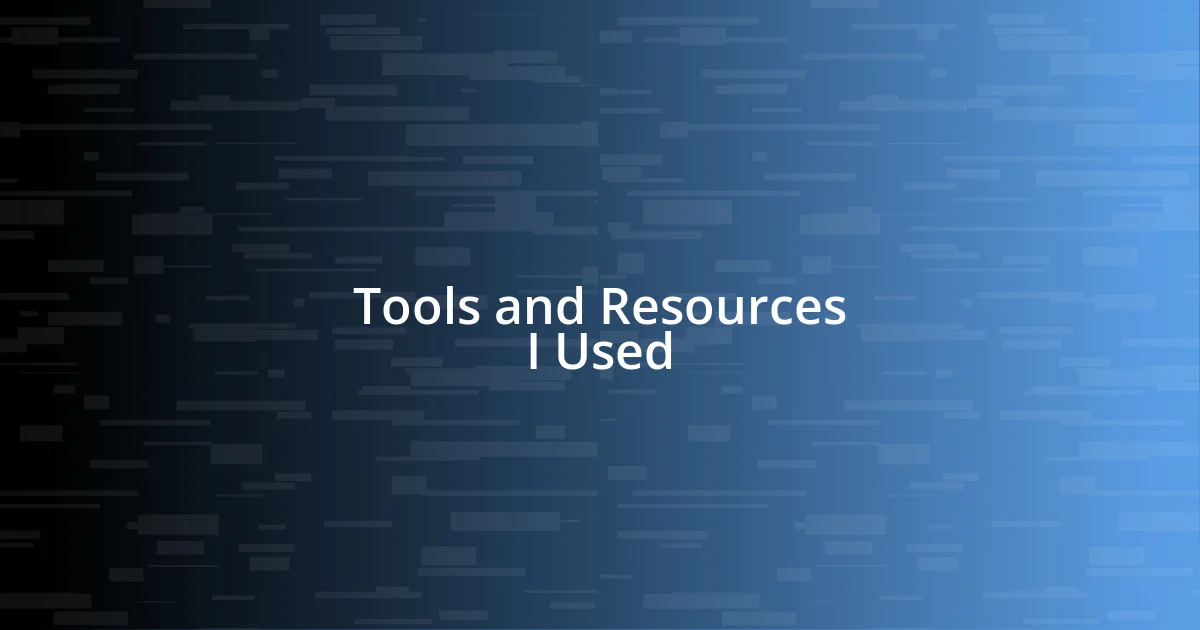
Tools and Resources I Used
In my journey, the tools I utilized were pivotal in shaping my understanding of security practices. For instance, I turned to online courses, particularly on platforms like Coursera and Udemy, which offered structured learning. I remember spending an entire weekend engrossed in a course about ethical hacking; the thrill of learning how to think like an attacker was both empowering and eye-opening.
I also relied heavily on forums and communities, such as Reddit’s cybersecurity threads and various Discord servers. Participating in live discussions with peers provided me not only with insights but also a sense of camaraderie. I can still recall the excitement of sharing my first successful security audit experience with others online, feeling that mutual encouragement spurred my confidence.
Additionally, I discovered the value of tools like Wireshark and Nmap, which became my go-to for network analysis. The first time I tracked down an unusual data packet through Wireshark, it was a moment of triumph. It struck me—here I was, not just another techie fumbling in the dark, but someone who could dissect network traffic with precision. How empowering is that? Each of these resources not only enhanced my practical skills but also fostered a deeper passion for cybersecurity.
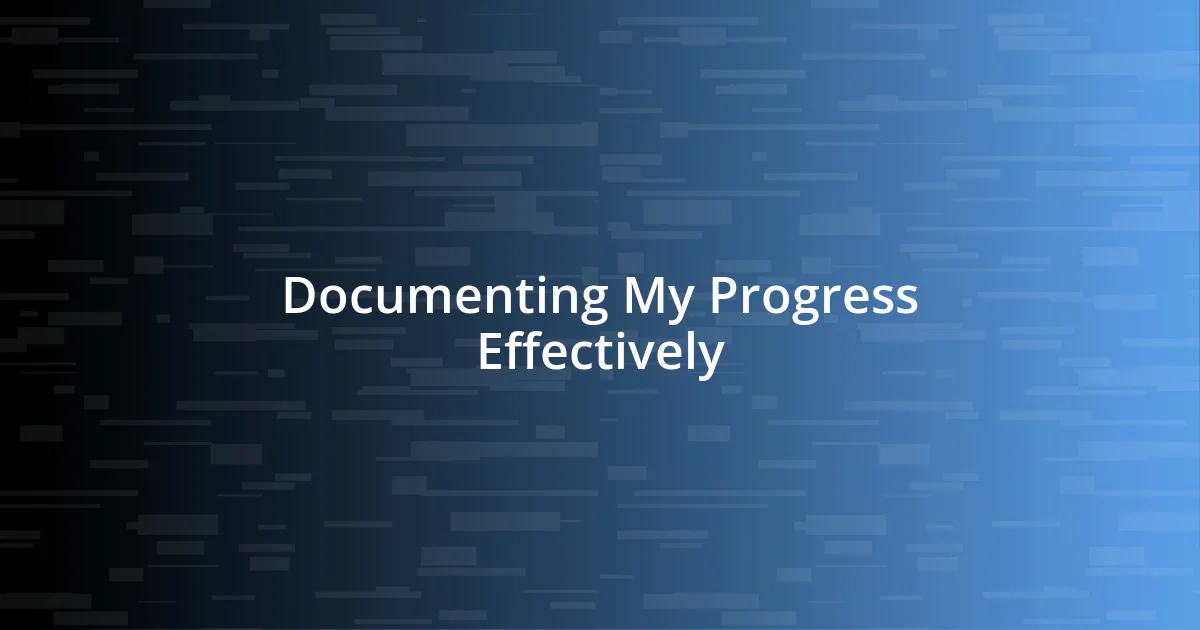
Documenting My Progress Effectively
Documenting my progress was a game-changer for me. I started keeping a dedicated security journal where I would jot down not just my successes but also my failures. I remember the time I misconfigured a firewall—what a learning experience that was. By documenting the steps I took, I was able to identify exactly where I went wrong, turning that mistake into a valuable teaching moment for myself.
As I moved forward, I realized how important it was to track not just my technical skills, but also my mindset. Crafting a visual roadmap of my journey helped me see connections between different experiences and skills. I used color coding and diagrams to represent areas of strength and those needing improvement. It was like creating a personalized blueprint of my development. Have you ever thought about how visualizing goals can invigorate your path? The clarity I gained was truly enlightening.
Looking back, I can appreciate how sharing my process with a mentor amplified my learning. Regular discussions made it easier to articulate my goals, and I learned the art of reflecting on my experiences. When was the last time you openly discussed your challenges with someone? For me, it became a powerful catalyst for growth and accountability, turning a solitary journey into one that was filled with support and insight.
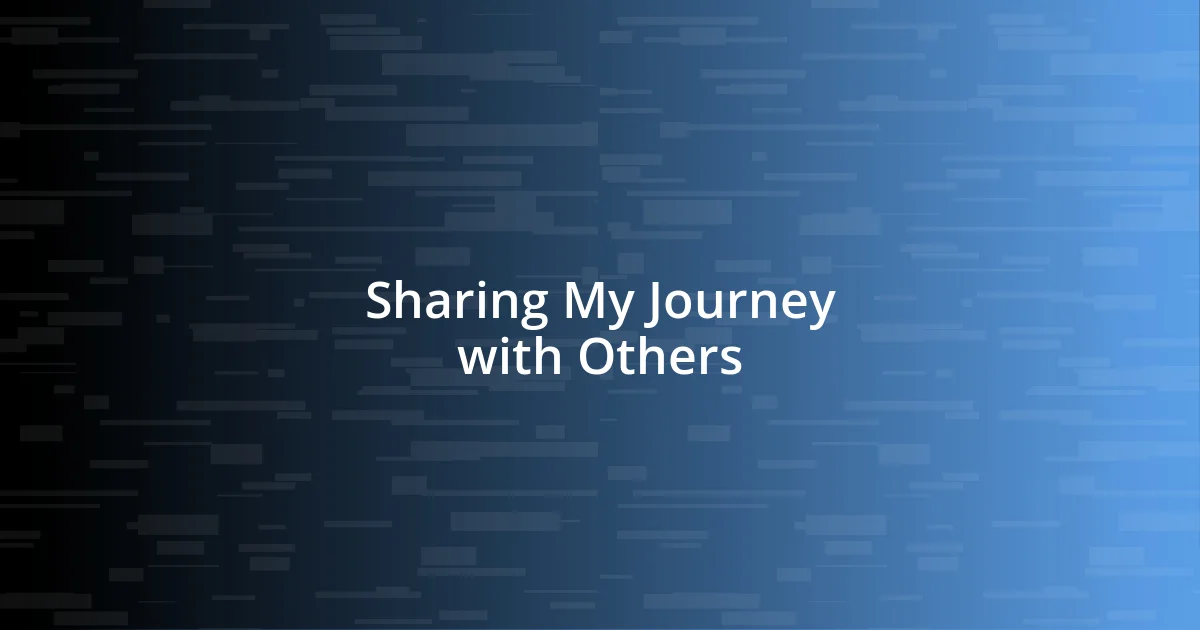
Sharing My Journey with Others
Sharing my journey with others has been incredibly rewarding. I made it a point to connect with fellow learners through local meetups and virtual events. I vividly remember a particular conference where I delivered a mini-presentation on my early security projects. The nervous energy I felt before stepping up to speak was quickly replaced with excitement as I shared stories of my errors and breakthroughs. These connections deepened my understanding and invited fresh perspectives.
I also took to social media to share snippets of my experiences. Whether it was a quick tweet about the latest security trend or a thoughtful LinkedIn post about a project I was proud of, the feedback from my network became a steady source of motivation. I often wonder how many people might benefit from hearing about my missteps and victories. When I received messages from beginners thanking me for my honesty, it reinforced the idea that openness fosters community.
Engaging in online discussions and mentorship has also enriched my journey. I sought advice from industry veterans and, in turn, found joy in mentoring newcomers. It’s fascinating how our experiences can resonate with others, igniting their passion for cybersecurity. Reflecting on these interactions, isn’t it amazing how shared stories can transform our individual paths into a collective journey? Each shared experience not only enhances my learning but also builds a supportive network that fuels ongoing growth.
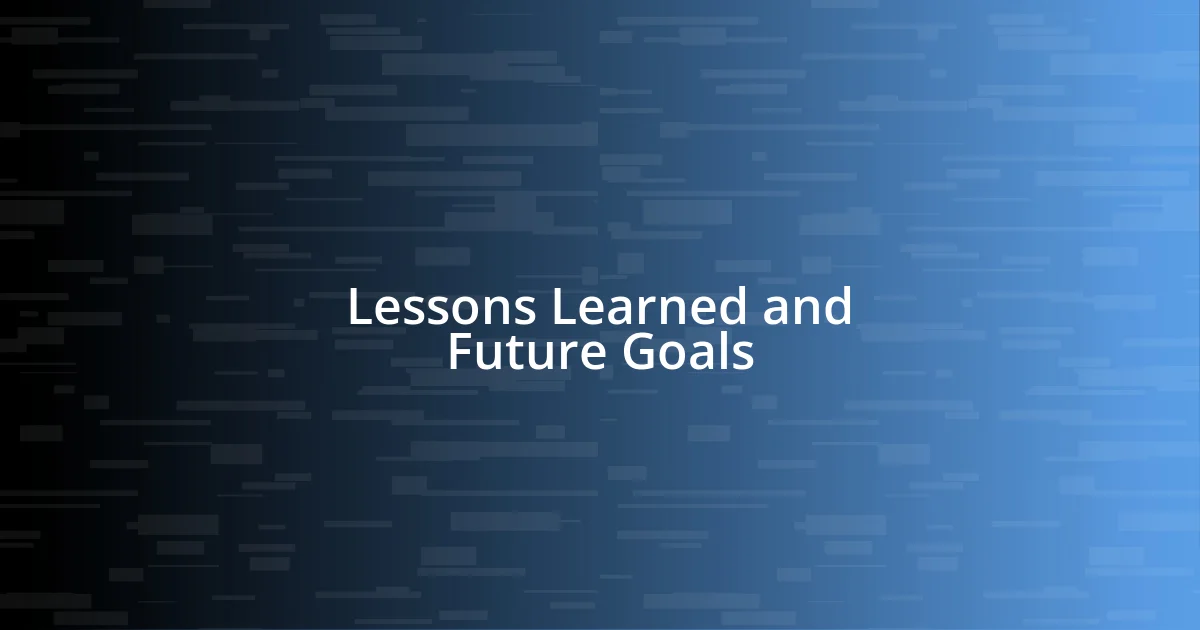
Lessons Learned and Future Goals
Reflecting on my journey, I’ve learned that flexibility is key. Early on, I set rigid goals, thinking that strict timelines would keep me on track. However, life had other plans, and I found that allowing myself room to adapt led to unexpected opportunities for growth. Have you ever felt confined by your own goals? For me, loosening those constraints opened doors I didn’t even know existed.
I’ve also come to appreciate the value of lifelong learning. Each obstacle has not been just a hurdle; it’s been a lesson waiting to unfold. For instance, I recently took an online course that dove deeper into threat analysis. It was incredibly challenging but invigorating at the same time. Isn’t it fascinating how every new skill acquired creates ripples through our existing knowledge? I can confidently say that my future goal is to never stop expanding my skill set and understanding of the evolving landscape of cyber threats.
Looking ahead, I aim to establish a mentorship program that fosters growth among emerging professionals. It’s a way for me to give back and share everything I’ve learned along the way. I often ask myself, how can I make the journey easier for someone just starting out? By guiding others, I hope to create a cycle of support that fuels both their success and my own. Each of these aspirations pushes me forward, igniting a passion for security that I can’t wait to explore even further.




